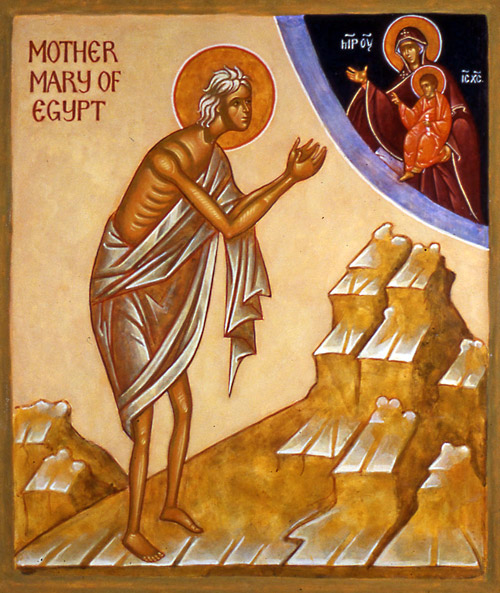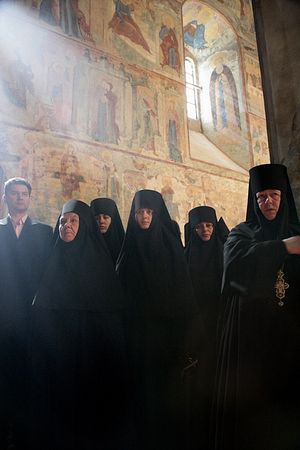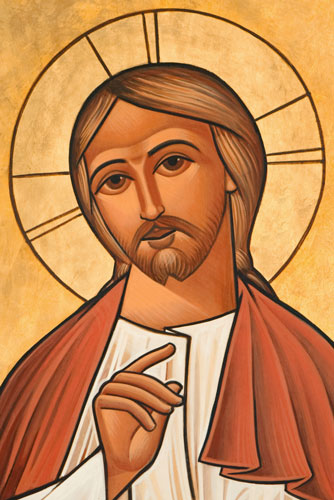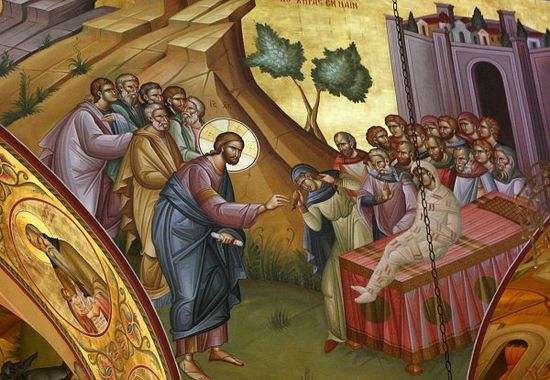The Requiem Office for the Dead (Panikhidi)
The origin of the Service of the Dead (Panikhidi) is as follows: St. Macarius of Alexandria once inquired from the Angels who accompanied him an explanation of the Church's custom to celebrate the third, ninth, and fortieth days after a death by religious services. And the Angel told him: "When, on the third day, the body is brought to the Temple, the Soul of the dead man receiveth from his Guardian Angel relief from the grief which he feeleth at parting from his body. This he receiveth because of the oblation and praise which are offered for him in God's Church, whence there ariseth in him a blessed hope. For during the space of two days the Soul is permitted to wander at will over the earth, with the Angels which accompany it. Therefore the Soul, since it loveth its body, sometimes hovereth around the house in which it parted from the body; sometimes around the coffin wherein its body hath been placed: and thus it passeth those days like a bird which seeketh for itself a nesting-place. But the beneficent Soul wandereth through those places where it was wont to perform deeds of righteousness.
Remember Sins and Despair Not: A Homily on the Sunday of St. Mary of Egypt
 This Sunday we commemorate the great female ascetic St. Mary of Egypt. There are so many things we can learn from St. Mary. The Church gives her to us during this time of fasting as the supreme example of a life of asceticism. Last Sunday was the Sunday of St. John Climacus whose book The Ladder of Divine Ascent is the supreme ascetical text, and this week we have St. Mary of Egypt who shows us the supreme ascetical life. We even read her entire life during the Great Canon of St. Andrew this past Thursday, so you know that she is incredibly important. There are so many things we can learn from her—but the thing I want to focus on is the remembrance of sins. I think that when we are tempted to sin we like to justify it to ourselves saying “I’ll just do this now, it won’t be a big deal, I can confess it later”—but this is precisely what the devil wants us to think. Before we fall he tries to convince us that our sin is no big deal, and afterwards he tries to drive us to despair over the sin we have just committed. But as we see from the life of St. Mary, sin never has just an immediate, temporary effect—the consequences stay with us. She lived a debaucherous, lustful life of iniquity for seventeen years, but upon her dramatic conversion she fled into the desert to flee the temptations that beset her and to dedicate her life to Christ in prayer and fasting. She was in the desert for forty-seven years before she met St. Zosimas, and as she tells him, for seventeen of those years she was continually haunted by the memories of her sins—of the rich food and alcohol she consumed, of the trashy songs she used to sing, and especially of the lustful deeds she used to commit. And she says these lustful memories and temptations were like a fire raging within her. The Church Fathers even say that when we die, our soul will remember every sinful deed it ever committed. This is a heavy teaching, a hard saying. The thought of this is simply terrifying. If we really, truly believed this and had this in our heart, then it would be very hard to transgress again. And this is why the Church teaches us to remember our sins and remember death.
This Sunday we commemorate the great female ascetic St. Mary of Egypt. There are so many things we can learn from St. Mary. The Church gives her to us during this time of fasting as the supreme example of a life of asceticism. Last Sunday was the Sunday of St. John Climacus whose book The Ladder of Divine Ascent is the supreme ascetical text, and this week we have St. Mary of Egypt who shows us the supreme ascetical life. We even read her entire life during the Great Canon of St. Andrew this past Thursday, so you know that she is incredibly important. There are so many things we can learn from her—but the thing I want to focus on is the remembrance of sins. I think that when we are tempted to sin we like to justify it to ourselves saying “I’ll just do this now, it won’t be a big deal, I can confess it later”—but this is precisely what the devil wants us to think. Before we fall he tries to convince us that our sin is no big deal, and afterwards he tries to drive us to despair over the sin we have just committed. But as we see from the life of St. Mary, sin never has just an immediate, temporary effect—the consequences stay with us. She lived a debaucherous, lustful life of iniquity for seventeen years, but upon her dramatic conversion she fled into the desert to flee the temptations that beset her and to dedicate her life to Christ in prayer and fasting. She was in the desert for forty-seven years before she met St. Zosimas, and as she tells him, for seventeen of those years she was continually haunted by the memories of her sins—of the rich food and alcohol she consumed, of the trashy songs she used to sing, and especially of the lustful deeds she used to commit. And she says these lustful memories and temptations were like a fire raging within her. The Church Fathers even say that when we die, our soul will remember every sinful deed it ever committed. This is a heavy teaching, a hard saying. The thought of this is simply terrifying. If we really, truly believed this and had this in our heart, then it would be very hard to transgress again. And this is why the Church teaches us to remember our sins and remember death.
The Fifteenth Instruction. On the holy forty days of Lent
 In the Law it is written that God commanded the sons of Israel to give a tenth part of all they had acquired during each year, and thereby bring a blessing upon all their deeds. With this in mind, the Holy Apostles established and committed to us as a help and benefaction for our souls something yet greater and more exalted--that we should set apart a tenth portion of the very days of our lives and devote them to God. Thereby might we also receive a blessing for all our deeds, and yearly cleanse the sins we have committed over the course of the whole year. Thus discerning, they have sanctified for us out of the 365 days of the year these seven weeks of Holy Great Lent. So they set apart these seven weeks; but later the Fathers deemed it wise to add yet another week: first of all, so that those wishing to initiate themselves in the ascesis of the fast over the course of this week might accustom themselves to it and prepare themselves for it; and secondly, in order to render honor to the number of days of the Great Fast which our Lord Jesus Christ fasted. For after subtracting Saturdays and Sundays from the eight weeks we have forty days; the fast on Great Saturday is particularly honored, because it is most sacred, and the only Saturdays throughout the year on which a fast it kept. Seven weeks minus Saturdays and Sundays make thirty-five days, then to this is added the fast of Holy and Great Saturday and half of the Bright and Light-bearing night; thus we have thirty-six and a half days, which equals exactly a tenth part of the 365 days of the year. For the tenth part of three hundred is thirty, the tenth part of sixty is six, and a tenth part of five is one-half (of the Bright Day). So, as we have said, there are thirty-six and a half days--the tenth portion of the whole year which, as I have said, the Holy Apostles have sanctified for us for repentance and the cleansing of the sins of the whole year.
In the Law it is written that God commanded the sons of Israel to give a tenth part of all they had acquired during each year, and thereby bring a blessing upon all their deeds. With this in mind, the Holy Apostles established and committed to us as a help and benefaction for our souls something yet greater and more exalted--that we should set apart a tenth portion of the very days of our lives and devote them to God. Thereby might we also receive a blessing for all our deeds, and yearly cleanse the sins we have committed over the course of the whole year. Thus discerning, they have sanctified for us out of the 365 days of the year these seven weeks of Holy Great Lent. So they set apart these seven weeks; but later the Fathers deemed it wise to add yet another week: first of all, so that those wishing to initiate themselves in the ascesis of the fast over the course of this week might accustom themselves to it and prepare themselves for it; and secondly, in order to render honor to the number of days of the Great Fast which our Lord Jesus Christ fasted. For after subtracting Saturdays and Sundays from the eight weeks we have forty days; the fast on Great Saturday is particularly honored, because it is most sacred, and the only Saturdays throughout the year on which a fast it kept. Seven weeks minus Saturdays and Sundays make thirty-five days, then to this is added the fast of Holy and Great Saturday and half of the Bright and Light-bearing night; thus we have thirty-six and a half days, which equals exactly a tenth part of the 365 days of the year. For the tenth part of three hundred is thirty, the tenth part of sixty is six, and a tenth part of five is one-half (of the Bright Day). So, as we have said, there are thirty-six and a half days--the tenth portion of the whole year which, as I have said, the Holy Apostles have sanctified for us for repentance and the cleansing of the sins of the whole year.
Will Everyone Eventually Be Saved?
 When they are in fashion, fads are never recognized as fads. Those under their influence and promoting them feel that they have come across “An Important New Truth,” or (if Orthodox) “An Important But Neglected Part of Our Tradition.” Recognizing them as fads would only serve to dismiss them from serious consideration. Thus fads never ’fess up.
When they are in fashion, fads are never recognized as fads. Those under their influence and promoting them feel that they have come across “An Important New Truth,” or (if Orthodox) “An Important But Neglected Part of Our Tradition.” Recognizing them as fads would only serve to dismiss them from serious consideration. Thus fads never ’fess up.
I suggest that the recent interest in Universalism—the belief that everyone will eventually be saved – is the latest fad. Evidence of this may be found in the fact that the view is being promoted by a number of different people who have little contact with one another and with little else in common, such as by scholar David Bentley Hart (in his essay God, Creation, and Evil), and also by Rob Bell (in his best-seller Love Wins). Admittedly the conviction that everyone will eventually be saved, including Satan and the demons, has been expressed from time to time throughout Christian history, but the majority of Christians have decided to pass on it. For people like the Orthodox who believe that God guides His Church and that therefore consensus matters, the solid fact of Christian consensus about the eternity of hell is surely significant.
The Widow of Nain
 Twenty-first Sunday after Pentecost
Twenty-first Sunday after Pentecost
In the Name of the Father and of the Son and of the Holy Spirit.
Today's Gospel concerns the resurrection of the son of the widow of Nain. We recall that this miracle occurred just after the healing of the servant of the centurion, a healing which had taken place at a distance.

